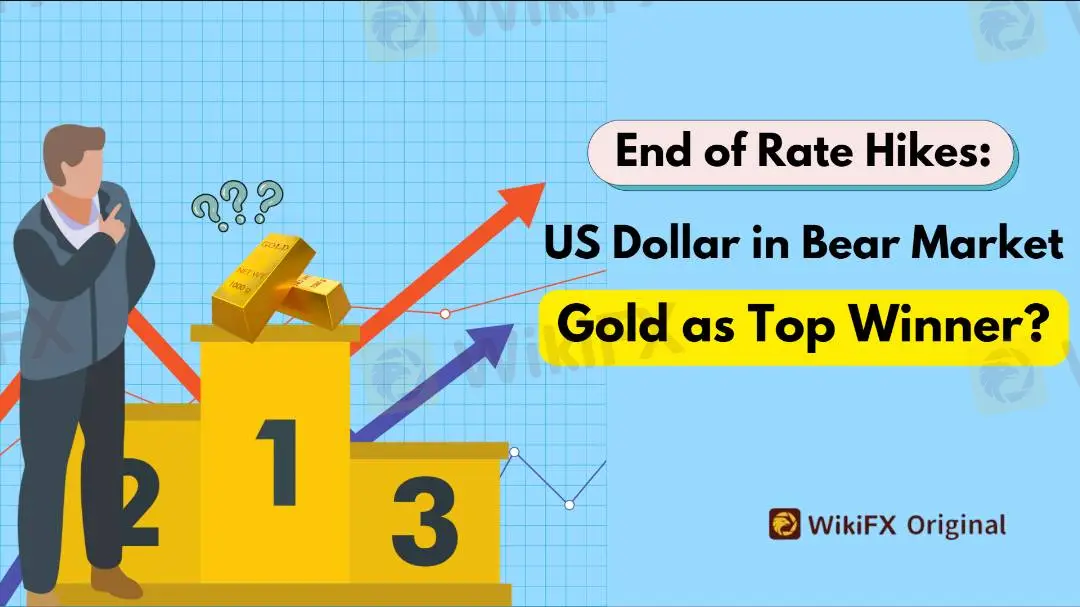简体中文
繁體中文
English
Pусский
日本語
ภาษาไทย
Tiếng Việt
Bahasa Indonesia
Español
हिन्दी
Filippiiniläinen
Français
Deutsch
Português
Türkçe
한국어
العربية
End of Rate Hikes: US Dollar in Bear Market, Gold as Top Winner?
Abstract:As the Federal Reserve's rate hiking process nears its end, an increasing number of financial industry professionals are becoming bearish on the outlook for the US dollar.

As the Federal Reserve's rate hiking process nears its end, an increasing number of financial industry professionals are growing pessimistic about the outlook for the US dollar.
Typically, when the Federal Reserve raises interest rates and increases the level of the federal funds rate, the US dollar index tends to rise. Conversely, if the Federal Reserve cuts interest rates, the US dollar index typically declines.
Economists at Wells Fargo Bank anticipate a moderate depreciation of the US dollar in the fourth quarter of this year, with an accelerated depreciation expected next year. In the short term, the US dollar may remain relatively stable due to further tightening of monetary policy by the Federal Reserve, coupled with potential minor market turbulence, providing temporary support for the dollar. However, the bank projects that as the Federal Reserve implements aggressive easing policies starting in early 2024, the US dollar will ultimately come under pressure. Wealth Bank forecasts a 1.5% decline in the US Dollar Index (DXY) in 2023 and a further 5% decline in 2024.
A previous report by UBS stated that the impasse in the negotiations on the US debt ceiling would have limited impact on the US dollar. Historical evidence suggests that the debate over a new debt ceiling agreement will continue to surface in the media, but its impact on the US dollar is expected to be limited as the foreign exchange market is forward-looking and assumes that Congress will reach an agreement at the last moment. While the current macroeconomic uncertainty benefits the US dollar, a pessimistic view on the dollar persists. UBS believes that reduced yield arbitrage, a reversal in European trade conditions, and outflows from the US dollar could pose resistance to the dollar in the latter half of the year.
Bank of America's Chief Investment Strategist, Michael Hartnett, stated that the US dollar is currently in its fourth bear market in the past 50 years, and he expects the US Dollar Index to decline by 20% in the long term. At the same time, Bank of America is optimistic about the performance of international gold prices and emerging market equities during the US dollar bear market.
Similarly, China Galaxy Securities pointed out that the US May Markit Services PMI continued to rise, reaching a new high. Coupled with the higher-than-expected year-on-year increase in US April Core PCE, market expectations for a 25 basis point interest rate hike by the Federal Reserve in June have increased. Over the weekend, the two parties in the US reached a tentative agreement on the debt ceiling negotiations, which is favorable for the downward movement of US bond yields and provides support for a rebound in gold prices. Looking ahead, there is still a risk of economic recession in the US, and the Federal Reserve may still have the possibility of cutting interest rates in the second half of the year. After a short-term volatility period, the gold sector is in a favorable position ahead of potential interest rate cuts.
China Futures also analyzed that precious metals are currently facing valuation pressures in the short term. However, in the long term, the interest rate curve is more likely to decline than rise, and the relative strength of the US economy is weakening. Therefore, there is still potential value in allocating to precious metals.

Disclaimer:
The views in this article only represent the author's personal views, and do not constitute investment advice on this platform. This platform does not guarantee the accuracy, completeness and timeliness of the information in the article, and will not be liable for any loss caused by the use of or reliance on the information in the article.
Read more

Italian Regulator Warns Against 5 Websites
The Italian regulator, CONSOB has issued a warning against five websites offering unauthorized financial services. This regulatory action aims to protect the public from fraudulent activities.

Trader Exposes Unethical Practices by STP Trading
A recent allegation against STP Trading has cast doubt on the firm's business practices, highlighting the potential risks faced by retail traders in an increasingly crowded and competitive market.

What Makes Cross-Border Payments Easier Than Ever?
Cross-border payments are now faster, cheaper, and simpler! Explore fintech, blockchain, and smart solutions to overcome costs, delays, and global payment hurdles.

FCA Identifies Clone Firm Exploiting Admiral Markets' Credibility
The UK Financial Conduct Authority (FCA) has issued a public warning regarding a fraudulent entity impersonating Admiral Markets, a legitimate and authorised trading firm. The clone firm, operating under the name Admiral EU Brokers and the domain Admiraleubrokerz.com, has been falsely presenting itself as an FCA-authorised business.
WikiFX Broker
Latest News
Hackers Charged for $11M Crypto Theft Using SIM-Swaps
Role of Central Banks in the FX Market
FCA Alerts Against Sydney FX
What Makes Cross-Border Payments Easier Than Ever?
Trader Exposes Unethical Practices by STP Trading
Malaysian Man Loses RM113,000 in Foreign Currency Investment Scam
Bitcoin Nears $100,000: A Triumph of Optimism or a Warning Sign?
Mastercard Partners with JPMorgan for B2B Cross-Border Payments
FCA Identifies Clone Firm Exploiting Admiral Markets' Credibility
Coinbase Under Scrutiny Amid Wrapped Bitcoin Delisting Controversy
Currency Calculator


